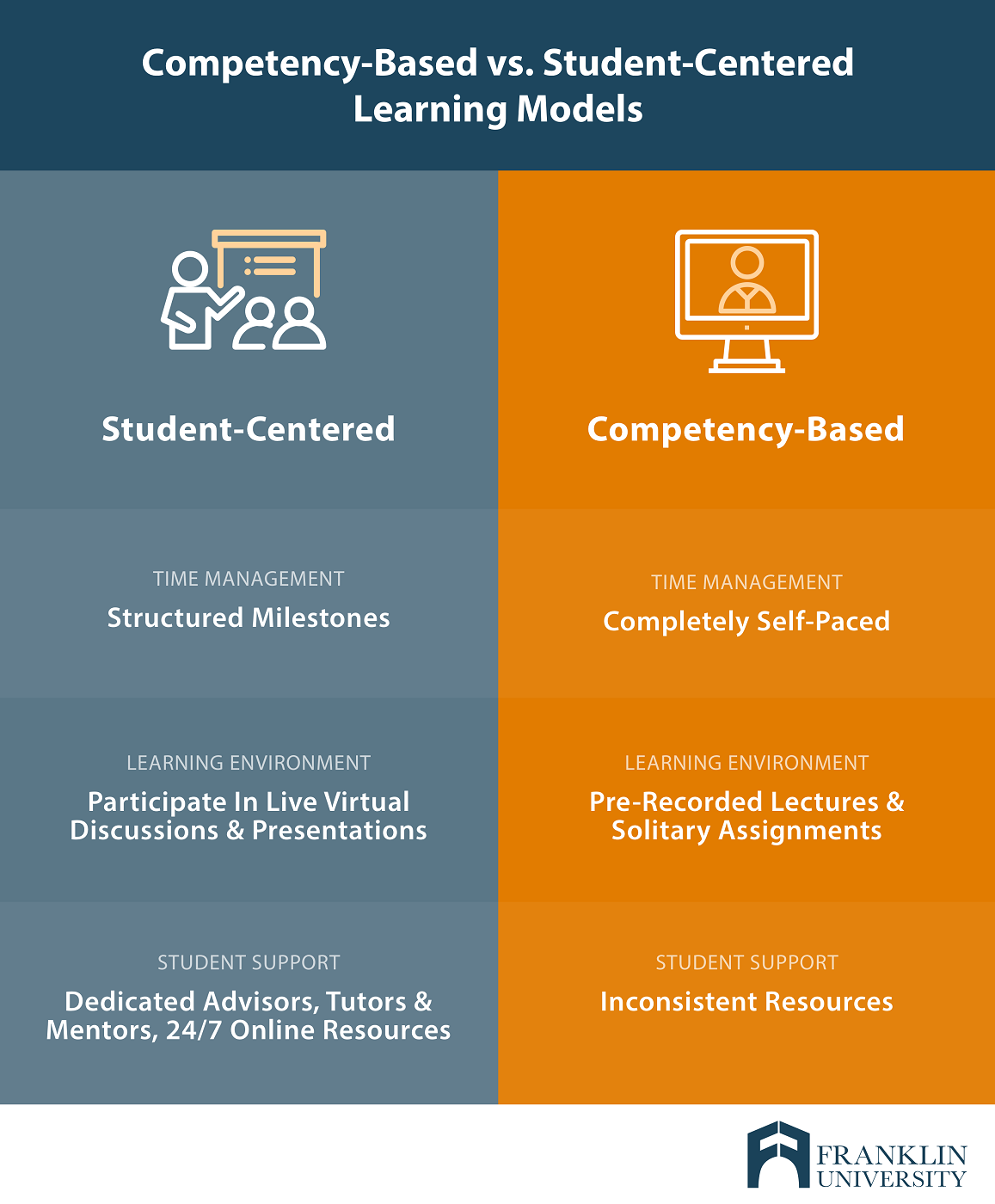Request Information
We're Sorry
There was an unexpected error with the form (your web browser was unable to retrieve some required data from our servers). This kind of error may occur if you have temporarily lost your internet connection. If you're able to verify that your internet connection is stable and the error persists, the Franklin University Help Desk is available to assist you at helpdesk@franklin.edu, 614.947.6682 (local), or 1.866.435.7006 (toll free).
Just a moment while we process your submission.

Is Online College Worth It?
Ever since the COVID-19 pandemic, online learning has become “a thing.” Truthfully, it’s been a popular choice for years now with some colleges and universities specializing in online degrees to fit the demands of busy, working professionals.
Now, with more and more schools shifting to online learning, it’s important to make a good decision about the worth and value of an online college degree.
It's also important to note that an online university is distinctly different from a college that’s only recently adapted to offering classes online. Keep reading to learn more about these differences and why they should matter to you.
Attending an Online University vs. Taking Online Classes
An important difference between an online university and taking online classes is that an online university specializes in creating a dynamic learning environment. To do this, accredited online universities hire professional instructional designers to develop their curriculums and rigorously test for the best, most effective ways to teach their course content for student success. Bottom line? Online universities intentionally and strategically design their curriculum, learning experience and evaluation process to be virtual whereas a traditional university that offers a few online courses may not follow best practices in online education.
.png)
When it comes to paying for school, grants are among your best options. But do you know how to find them? Remove the guesswork by downloading this free guide
A traditional college, however, may simply migrate their in-person courses online. As a result, this coursework can fall short of student needs and expectations.
Even if you’re comparing online colleges that have a long history of online instruction, it’s important to keep in mind that not all schools or degree programs are created equal.
From nonprofit to for-profit online universities and to online-only models to hybrid offerings, here are some of the many factors to consider when determining the worth of your online education.
How Do You Know If An Online College is Legitimate?
Online degrees continue to grow in popularity. Labor analytics firm Lightcast reports that more than 1.6 million degrees were completed online in 2021 alone, accounting for 42% of all degree program completions that year. Yet, from 2012 to 2021, completions of traditional, non-distanced offered programs declined by 8.7%.
Despite the numbers, not all online colleges are worth it. Which is why it’s better to separate the online colleges that are worth the investment from the ones that aren’t.
See if you can answer yes to these six qualifying questions:
- Is my online college institutionally accredited?
- Does my online college offer tailored support services and resources for my success?
- Does my online college provide an engaging, interactive and hands-on learning environment?
- Will I gain both essential technical skills and all-important soft skills that can differentiate me in my career?
- Will a degree from my online college be respected by employers?
- Will my short- and long-term earning and hiring potential improve with an online degree from my chosen school?
Pros and Cons of Online College
Here’s a secret. There is no such thing as an “online degree.” You can earn a bachelor’s, master’s or doctorate credential from both a traditional college and from an accredited online university. Remember, choosing an online college says more about the way you learn rather than the degree you earn.
Pros: 8 Unique Benefits of Earning a Degree from an Online University
If you choose the right online college or university, the quality of your education and learning experience should be the same—or better—than a traditional college. Here are eight unique benefits of earning your degree from an accredited online college.
- The opportunity cost of your degree is less because you can continue to earn income while pursuing your degree. Tuition and fees may be lower than on-campus programs, too.
- You can experience the incremental worth of your degree because you’re able to apply the skills you learn in your classes to your current role–starting from Day One. It's not uncommon for professionals to be promoted even before they complete their online degree program.
- Online collaboration and presentation skills are embedded into the online degree. This means you’ll be prepared to use in-demand tools within an increasingly virtual business landscape.
- You have a more flexible academic calendar and course schedule, making it easier to earn your degree at your own pace and around your busy life.
- Online course content goes beyond academic theory, which means it’s geared toward real-world application.
- The learning environment is more diverse. Professionals from different backgrounds, experience levels and geographic locations add unique perspectives to course content.
- You save time and money by eliminating your commute; time better spent on academic, professional or personal pursuits.
- You learn what you need to learn, thanks to standardized online courses and defined learning outcomes. No need to rely on individual professors to develop one-off course content.
Cons: 4 Drawbacks of Online Colleges
There are plenty of low-quality or for-profit colleges that deliver little to no long-term value. Here are four of the biggest pitfalls to look for.
- Beware of online college scams. Illegitimate online colleges may create a highly convincing facade. So, do your research by looking into the school’s accreditation, graduation rates and student reviews.
- Time management can be a challenge. Some online colleges, especially those using a competency-based approach, lack structure and deadlines for completing coursework. If you thrive in a predictable learning environment, make sure you choose an online college that emphasizes a balanced learning approach. This means you complete about the same amount of work each week throughout the course, making it easier to schedule around your other priorities.
- Your learning environment may lead to feeling isolated. Competency-based online courses are taken at your own pace. This may sound like a benefit, but it also means you give up the benefit of a collaborative, interactive learning environment. An instructor-led and student-centered online college emphasizes 360-degree learning where working together is both essential and beneficial. The best programs also record lectures and tailor assignments so you can more easily navigate scheduling conflicts.
- Student support systems vary widely. Some online colleges lack personal support. If you choose a competency-based online program, you may have less access to instructors, advisors and peers. In fact, you may only receive support if you’re really struggling in a course. A high-quality online college will offer dedicated student resources whether you’re struggling or not. Personal academic advisors, active and engaged instructors, and 24/7 resources like online libraries can make all the difference when it comes to successfully finishing your degree.
Online Education: Student-Centered vs. Competency-Based
There are two competing models for online learning; (1) student-centered and (2) competency-based.
What is Student-Centered Online Learning?
Student-centered online learning focuses on outcomes to meet the evolving needs of students and employers. Student-centered courses balance autonomy with structured student support.
What you can expect:
- Defined course timelines
- Instructor-led classes
- Collaborative assignments
What is Competency-Based Online Learning?
Competency-based online education is a predominantly solitary learning experience. You set the pace for your learning, only moving to the next course after proving your expertise in a topic.
What you can expect:
- A linear learning experience
- Limited interaction with instructors
- Courses without deadlines

The Right Online College Is Worth It
Even the most motivated student needs a little support now and then. A high-quality online college can give you that–and so much more.
Of course, you shouldn’t rely solely on the input of others or even online reviews of online colleges and degree programs. Instead, take a close look for yourself at the online college of your choice. Make sure the college itself and its degree programs are relevant to your personal and professional goals.
And if you need a jumpstart, explore this college for working adults. Use the features and benefits of this program to create your own must-have checklist to help you narrow down your choices and pick the program that’s right for you.





